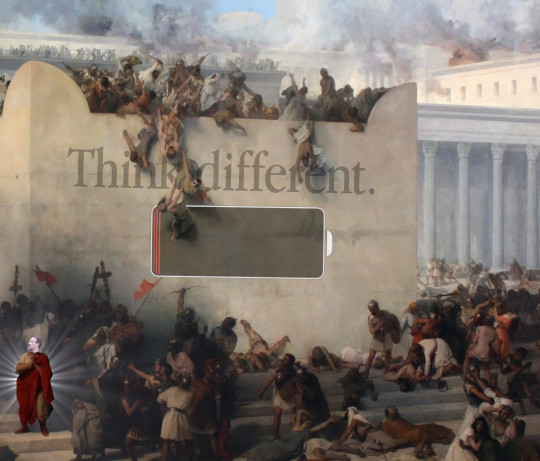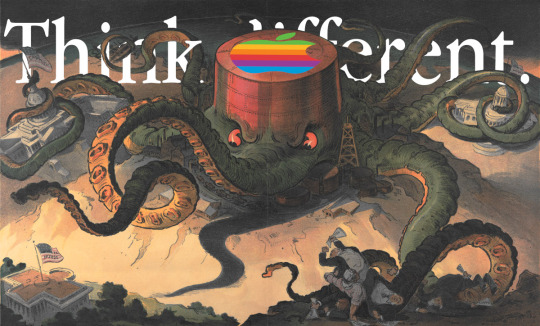#manori
Text
When Facebook came for your battery, feudal security failed

When George Hayward was working as a Facebook data-scientist, his bosses ordered him to run a “negative test,” updating Facebook Messenger to deliberately drain users’ batteries, in order to determine how power-hungry various parts of the apps were. Hayward refused, and Facebook fired him, and he sued:
https://nypost.com/2023/01/28/facebook-fires-worker-who-refused-to-do-negative-testing-awsuit/
If you’d like an essay-formatted version of this post to read or share, here’s a link to it on pluralistic.net, my surveillance-free, ad-free, tracker-free blog:
https://pluralistic.net/2023/02/05/battery-vampire/#drained
Hayward balked because he knew that among the 1.3 billion people who use Messenger, some would be placed in harm’s way if Facebook deliberately drained their batteries — physically stranded, unable to communicate with loved ones experiencing emergencies, or locked out of their identification, payment method, and all the other functions filled by mobile phones.
As Hayward told Kathianne Boniello at the New York Post, “Any data scientist worth his or her salt will know, ‘Don’t hurt people…’ I refused to do this test. It turns out if you tell your boss, ‘No, that’s illegal,’ it doesn’t go over very well.”
Negative testing is standard practice at Facebook, and Hayward was given a document called “How to run thoughtful negative tests” regarding which he said, “I have never seen a more horrible document in my career.”
We don’t know much else, because Hayward’s employment contract included a non-negotiable binding arbitration waiver, which means that he surrendered his right to seek legal redress from his former employer. Instead, his claim will be heard by an arbitrator — that is, a fake corporate judge who is paid by Facebook to decide if Facebook was wrong. Even if he finds in Hayward’s favor — something that arbitrators do far less frequently than real judges do — the judgment, and all the information that led up to it, will be confidential, meaning we won’t get to find out more:
https://pluralistic.net/2022/06/12/hot-coffee/#mcgeico
One significant element of this story is that the malicious code was inserted into Facebook’s app. Apps, we’re told, are more secure than real software. Under the “curated computing” model, you forfeit your right to decide what programs run on your devices, and the manufacturer keeps you safe. But in practice, apps are just software, only worse:
https://pluralistic.net/2022/06/23/peek-a-boo/#attack-helicopter-parenting
Apps are part what Bruce Schneier calls “feudal security.” In this model, we defend ourselves against the bandits who roam the internet by moving into a warlord’s fortress. So long as we do what the warlord tells us to do, his hired mercenaries will keep us safe from the bandits:
https://locusmag.com/2021/01/cory-doctorow-neofeudalism-and-the-digital-manor/
But in practice, the mercenaries aren’t all that good at their jobs. They let all kinds of badware into the fortress, like the “pig butchering” apps that snuck into the two major mobile app stores:
https://arstechnica.com/information-technology/2023/02/pig-butchering-scam-apps-sneak-into-apples-app-store-and-google-play/
It’s not merely that the app stores’ masters make mistakes — it’s that when they screw up, we have no recourse. You can’t switch to an app store that pays closer attention, or that lets you install low-level software that monitors and overrides the apps you download.
Indeed, Apple’s Developer Agreement bans apps that violate other services’ terms of service, and they’ve blocked apps like OG App that block Facebook’s surveillance and other enshittification measures, siding with Facebook against Apple device owners who assert the right to control how they interact with the company:
https://pluralistic.net/2022/12/10/e2e/#the-censors-pen
When a company insists that you must be rendered helpless as a condition of protecting you, it sets itself up for ghastly failures. Apple’s decision to prevent every one of its Chinese users from overriding its decisions led inevitably and foreseeably to the Chinese government ordering Apple to spy on those users:
https://pluralistic.net/2022/11/11/foreseeable-consequences/#airdropped
Apple isn’t shy about thwarting Facebook’s business plans, but Apple uses that power selectively — they blocked Facebook from spying on Iphone users (yay!) and Apple covertly spied on its customers in exactly the same way as Facebook, for exactly the same purpose, and lied about it:
https://pluralistic.net/2022/11/14/luxury-surveillance/#liar-liar
The ultimately, irresolvable problem of Feudal Security is that the warlord’s mercenaries will protect you against anyone — except the warlord who pays them. When Apple or Google or Facebook decides to attack its users, the company’s security experts will bend their efforts to preventing those users from defending themselves, turning the fortress into a prison:
https://pluralistic.net/2022/10/20/benevolent-dictators/#felony-contempt-of-business-model
Feudal security leaves us at the mercy of giant corporations — fallible and just as vulnerable to temptation as any of us. Both binding arbitration and feudal security assume that the benevolent dictator will always be benevolent, and never make a mistake. Time and again, these assumptions are proven to be nonsense.
Image:
Anthony Quintano (modified)
https://commons.wikimedia.org/wiki/File:Mark_Zuckerberg_F8_2018_Keynote_%2841118890174%29.jpg
CC BY 2.0:
https://creativecommons.org/licenses/by/2.0/deed.en
[Image ID: A painting depicting the Roman sacking of Jerusalem. The Roman leader's head has been replaced with Mark Zuckerberg's head. The wall has Apple's 'Think Different' wordmark and an Ios 'low battery' icon.]
Next week (Feb 8-17), I'll be in Australia, touring my book *Chokepoint Capitalism* with my co-author, Rebecca Giblin. We'll be in Brisbane on Feb 8, and then we're doing a remote event for NZ on Feb 9. Next is Melbourne, Sydney and Canberra. I hope to see you!
https://chokepointcapitalism.com/
#pluralistic#manorial security#feudal security#apple#mobile#apps#security through obscurity#binding arbitration#arbitration waivers#transparency#danegeld#surveillance lag
4K notes
·
View notes
Photo

July, Les Tres Riches Heures
A medieval manuscript illustration depicting the work on an agricultural estate during the month of July. From 'Les Très Riches Heures du Duc de Berry', c. 1412-1440 CE. (Condé Museum, Château de Chantilly, Oise, France)
Image by Limbourg Brothers
354 notes
·
View notes
Note
Did nobles interact with commoners regularly, and if so did they do so outside formal sessions? For instance would nobles leave their manors and engage one to one, or was this likely to end in violence?
I've actually written quite a bit about this: it was considered to be an important part of a noble's political education for them to learn how to "condescend" gracefully to the commons without either being overly "familiar" or "giving insult." It's a bit like how we expect modern politicians to be very good at surface level social interaction - shaking hands, kissing babies, remembering people's names, etc.
A nobleman who couldn't do that - John of Gaunt was famous for being utterly crap at it - would get a bad reputation as overly proud (in one direction) or obsequious.
#estate management#manorialism#manor house#nobility#smallfolk#medieval politics#medieval culture#medieval cultural politics
71 notes
·
View notes
Text



#ferrari#ferrari monza#sp1#monza sp1#ferrari monza sp1#manory#tuning#custom#customized#supercar#supercars#super car#cars#car#fast car#luxury#fast cars#luxurycars
12 notes
·
View notes
Text
Okay, tiny but charmingly passionate Robin of Sherwood fandom, help me out here: are there fandom theories about whether or not Herne the Hunter has given Marion the magical equivalent of an IUD? Medieval contraceptive strategies, devices, etc. exist, but they are not foolproof. This woman has been living in the greenwood with the man who is her lover and husband for over 5 years. I have questions.
#robin of sherwood#robin hood summer#yes these are the things i choose to think about#apparently#that and the manorial system obviously#fun with medievalism#i read an interview with the writer/creator recently#in which he talked about toning down the robin/marion romance b/c of an afternoon slot#and...#this is the pg version???? (i mean yes on a TECHNICALITY)#these two people have more chemistry than actors i have seen fully naked in romcoms#anyway#thoughts questions etc.
60 notes
·
View notes
Text
So, the thing about Don Quixote.
The thing about Don Quixote is that he tilts at windmills - tilts in the archaic sense of ‘charge at with a lance,’ because it’s the story of a guy who read so much chivalric romance that he lost his mind and started larping as a knight-errant. He was, if you’ll pardon the phrasing, chivalrybrained.
The thing about Don Quixote is, sometimes people take it as this story of whimsical and bravely misguided individualism or ‘being yourself’ or whatever, and they’re wrong. If it took place in the modern day, Don Quixote would absolutely be the story of a trust fund kid who blew his inheritance being a gacha whale until his internet got cut off so now he wanders around insisting that people refer to him as ‘Gudako.’
But the real thing about Don Quixote is that it was published in the early 1600s, and the thing about the 1600s is that Europe was one big tire fire. This is because 1600s Europe was still organized around feudalism (or ‘vassalage and manorialism’ if ya nasty), which assumed that land (and the peasants attached to it) were the only source of wealth. And that had worked just fine (well, ‘just fine,’ it was still feudalism) for a long time, because Europe had been a relative backwater with little in the way of urbanization or large-scale trade.
That was no longer true for Europe in the 1600s. The combination of urban development, technological advances, and brutal Spanish colonialism meant that land was no longer the sole source of wealth. Sudden there was a new class of business-savvy, investment-minded upwardly-mobile commoners, and another new class of downwardly-mobile gentry who simply couldn’t compete in this new fast-paced economy. Cervantes saw this process with his own eyes.
One of the symbols of this new age was the windmill, a complicated piece of engineering that was expensive to build but would then produce profits indefinitely - in other words, a windmill was capital.
The thing about Don Quixote is, when he tilts at windmills, he has correctly identified his nemesis.
17K notes
·
View notes
Link

The disfavour incurred by the attempt to retain the manorial system was increased when the organisation itself began to show signs of decay. The decline of religious fervour was followed by a gradual relaxation of monastic discipline, and comparative luxury invaded the cloister. After the death of John of Berkhamstead in 1301 the extent of the falling off began to be apparent. For the next generation the convent was in an unhealthy condition. But though weakened, the organisation was far from being destroyed. At times like this the traditional routine was invaluable. The writing of history, for instance, was continued,7 and the period is still known to us by the works of John de Trokelowe and Henry de Blaneford, contemporary chroniclers.
At this point our subject begins. The period may be broken up into two parts, and a line of division is supplied by the year 1396, in which Abbot Thomas de la Mare died. Taking our stand, first at 1396, and then at the Dissolution of the Monasteries, we shall look back over the two periods under review and summarize the chief tendencies by which they are marked.7
0 notes
Text
obsessing over content that doesnt and will never actually become official
#ok so story time#we had a presentation that we spent 2 weeks preparing for prior#my grp was so prepared and excited#we had costumes#our ppt was AMAZING#it was perfect basically#so today we do the presentation#ppl r excited to watch#FRIM THE BEGINNING FROM THE START#ONCE I SAID THE FIRST LINES#someoen already loved it#yeah theyre gonna win#we presented a video game pitch#for a dating sim#including feaudalism and manorialism#we had characters that were developed#ppl simped so much for the knight !!#i wrote the lines that they said#SO WE HAD A DEMO AND AN INTRO TO THE CHARS#the intro had pol screaming and shoutng#then we went overtiem but the teacher let us continue bcus tue class shouted yes !!!!#and we continues#AND IM SO PROUD OF THE PPT AND THEIR ACTING#IT WAS SO AMAZING#it was the peak of my highschool#so im obsessing over the game#knowing it will never be a game#bcus students made it for a school project and yeah#BUT IM OBSESSIGN AND FANGIRLING#zbdb
0 notes
Text
Nobility Title to Become a Lord or Lady
Buy a title of nobility from the select titles website and become a lord or lady of Tattingstone park. We have different title packs available at discounted prices. Our titles are available for anyone who wants to buy them, regardless of their location. We are one of the UK’s leading providers of nobility titles, including Lord Titles, Lady Titles, and Laird Titles. If you want to purchase a Manorial title with a special offer, visit our website now.

#become a lord#become a lady#buy a title of nobility#Nobility Title#buy a title#lordships for sale#become a lord or lady#manorial titles#england#lord or lady#manorial title
0 notes
Text
Cycling by the bay






youtube
17 December 2022, almost year end and Christmas is coming.
22.07 km ride, with sunset in time lapse movie.
0 notes
Text
Watch "Mahagun Manorial Walkthrough" on YouTube
youtube
#youtube#4 bhk flat in mahagun manorial sector 128 noida#3 bhk flat in mahagun manorial sector 128#mahagun manorial#luxury apartment in noida#good project on noida expressway location#under construction project in noida
1 note
·
View note
Photo

Serf
Medieval serfs (aka villeins) were unfree labourers who worked the land of a landowner (or tenant) in return for physical and legal protection and the right to work a separate piece of land for their own basic needs. Serfs made up 75% of the medieval population but were not slaves as only their labour could be bought, not their person.
Continue reading...
177 notes
·
View notes
Note
Do you think House Butterwell would have owned their herds of cattle directly, or would they divide them up among their vassals? Or both? Given that fresh milk and cream aren’t very portable or storable without refrigeration, would they likely have invested in butter and cheese making operations as well? How important do you think the relative proximity to Kings Landing and it’s half a million potential customers was to Butterwell’s wealth?
Both.
The Butterwells would have owned cattle themselves, but only as many as they could run on the lands they owned directly. When it comes to land held in tenancy by their peasants, the cattle on those lands would most likely be owned by the tenants, although it wasn't unknown for peasants to rent livestock from their landlords.
Whether milk and cream were produced for market would have depended a lot on how close the farms were to towns and other commercial towns - if you were a day or less' travel away from a major population center, then selling milk and cream made economic sense.
However, it's also true that no self-respecting dairy farm would be without churns to make butter, cheese strainers and moulds to make cheese, and so forth. And the dairy farms of House Butterwell would both supply the Whitewalls "buttery," serve as a staple diet of Butterwell tenants, and would be sold on to nearby markets.
45 notes
·
View notes
Text



#ferrari#ferrari monza#sp1#monza sp1#ferrari monza sp1#manory#tuning#custom#customized#supercar#supercars#super car#cars#car#fast car#luxury#fast cars#luxurycars
9 notes
·
View notes
Text
The antitrust case against Apple

I'm on tour with my new, nationally bestselling novel The Bezzle! Catch me TONIGHT (Mar 22) in TORONTO, then SUNDAY (Mar 24) with LAURA POITRAS in NYC, then Anaheim, and beyond!

The foundational tenet of "the Cult of Mac" is that buying products from a $3t company makes you a member of an oppressed ethnic minority and therefore every criticism of that corporation is an ethnic slur:
https://pluralistic.net/2024/01/12/youre-holding-it-wrong/#if-dishwashers-were-iphones
Call it "Apple exceptionalism" – the idea that Apple, alone among the Big Tech firms, is virtuous, and therefore its conduct should be interpreted through that lens of virtue. The wellspring of this virtue is conveniently nebulous, which allows for endless goal-post shifting by members of the Cult of Mac when Apple's sins are made manifest.
Take the claim that Apple is "privacy respecting," which is attributed to Apple's business model of financing its services though cash transactions, rather than by selling it customers to advertisers. This is the (widely misunderstood) crux of the "surveillance capitalism" hypothesis: that capitalism is just fine, but once surveillance is in the mix, capitalism fails.
Apple, then, is said to be a virtuous company because its behavior is disciplined by market forces, unlike its spying rivals, whose ability to "hack our dopamine loops" immobilizes the market's invisible hand with "behavior-shaping" shackles:
http://pluralistic.net/HowToDestroySurveillanceCapitalism
Apple makes a big deal out of its privacy-respecting ethos, and not without some justification. After all, Apple went to the mattresses to fight the FBI when they tried to force Apple to introduced defects into its encryption systems:
https://www.eff.org/deeplinks/2018/04/fbi-could-have-gotten-san-bernardino-shooters-iphone-leadership-didnt-say
And Apple gave Ios users the power to opt out of Facebook spying with a single click; 96% of its customers took them up on this offer, costing Facebook $10b (one fifth of the pricetag of the metaverse boondoggle!) in a single year (you love to see it):
https://arstechnica.com/gadgets/2021/02/facebook-makes-the-case-for-activity-tracking-to-ios-14-users-in-new-pop-ups/
Bruce Schneier has a name for this practice: "feudal security." That's when you cede control over your device to a Big Tech warlord whose "walled garden" becomes a fortress that defends you against external threats:
https://pluralistic.net/2021/06/08/leona-helmsley-was-a-pioneer/#manorialism
The keyword here is external threats. When Apple itself threatens your privacy, the fortress becomes a prison. The fact that you can't install unapproved apps on your Ios device means that when Apple decides to harm you, you have nowhere to turn. The first Apple customers to discover this were in China. When the Chinese government ordered Apple to remove all working privacy tools from its App Store, the company obliged, rather than risk losing access to its ultra-cheap manufacturing base (Tim Cook's signal accomplishment, the one that vaulted him into the CEO's seat, was figuring out how to offshore Apple manufacturing to China) and hundreds of millions of middle-class consumers:
https://www.reuters.com/article/us-china-apple-vpn/apple-says-it-is-removing-vpn-services-from-china-app-store-idUSKBN1AE0BQ
Killing VPNs and other privacy tools was just for openers. After Apple caved to Beijing, the demands kept coming. Next, Apple willingly backdoored all its Chinese cloud services, so that the Chinese state could plunder its customers' data at will:
https://www.nytimes.com/2021/05/17/technology/apple-china-censorship-data.html
This was the completely foreseeable consequence of Apple's "curated computing" model: once the company arrogated to itself the power to decide which software you could run on your own computer, it was inevitable that powerful actors – like the Chinese Communist Party – would lean on Apple to exercise that power in service to its goals.
Unsurprisingly, the Chinese state's appetite for deputizing Apple to help with its spying and oppression was not sated by backdooring iCloud and kicking VPNs out of the App Store. As recently as 2022, Apple continued to neuter its tools at the behest of the Chinese state, breaking Airdrop to make it useless for organizing protests in China:
https://pluralistic.net/2022/11/11/foreseeable-consequences/#airdropped
But the threat of Apple turning on its customers isn't limited to China. While the company has been unwilling to spy on its users on behalf of the US government, it's proven more than willing to compromise its worldwide users' privacy to pad its own profits. Remember when Apple let its users opt out of Facebook surveillance with one click? At the very same time, Apple was spinning up its own commercial surveillance program, spying on Ios customers, gathering the very same data as Facebook, and for the very same purpose: to target ads. When it came to its own surveillance, Apple completely ignored its customers' explicit refusal to consent to spying, spied on them anyway, and lied about it:
https://pluralistic.net/2022/11/14/luxury-surveillance/#liar-liar
Here's the thing: even if you believe that Apple has a "corporate personality" that makes it want to do the right thing, that desire to be virtuous is dependent on the constraints Apple faces. The fact that Apple has complete legal and technical control over the hardware it sells – the power to decide who can make software that runs on that hardware, the power to decide who can fix that hardware, the power to decide who can sell parts for that hardware – represents an irresistible temptation to enshittify Apple products.
"Constraints" are the crux of the enshittification hypothesis. The contagion that spread enshittification to every corner of our technological world isn't a newfound sadism or indifference among tech bosses. Those bosses are the same people they've always been – the difference is that today, they are unconstrained.
Having bought, merged or formed a cartel with all their rivals, they don't fear competition (Apple buys 90+ companies per year, and Google pays it an annual $26.3b bribe for default search on its operating systems and programs).
Having captured their regulators, they don't fear fines or other penalties for cheating their customers, workers or suppliers (Apple led the coalition that defeated dozens of Right to Repair bills, year after year, in the late 2010s).
Having wrapped themselves in IP law, they don't fear rivals who make alternative clients, mods, privacy tools or other "adversarial interoperability" tools that disenshittify their products (Apple uses the DMCA, trademark, and other exotic rules to block third-party software, repair, and clients).
True virtue rests not merely in resisting temptation to be wicked, but in recognizing your own weakness and avoiding temptation. As I wrote when Apple embarked on its "curated computing" path, the company would eventually – inevitably – use its power to veto its customers' choices to harm those customers:
https://memex.craphound.com/2010/04/01/why-i-wont-buy-an-ipad-and-think-you-shouldnt-either/
Which is where we're at today. Apple – uniquely among electronics companies – shreds every device that is traded in by its customers, to block third parties from harvesting working components and using them for independent repair:
https://www.vice.com/en/article/yp73jw/apple-recycling-iphones-macbooks
Apple engraves microscopic Apple logos on those parts and uses these as the basis for trademark complaints to US customs, to block the re-importation of parts that escape its shredders:
https://repair.eu/news/apple-uses-trademark-law-to-strengthen-its-monopoly-on-repair/
Apple entered into an illegal price-fixing conspiracy with Amazon to prevent used and refurbished devices from being sold in the "world's biggest marketplace":
https://pluralistic.net/2022/11/10/you-had-one-job/#thats-just-the-as
Why is Apple so opposed to independent repair? Well, they say it's to keep users safe from unscrupulous or incompetent repair technicians (feudal security). But when Tim Cook speaks to his investors, he tells a different story, warning them that the company's profits are threatened by customers who choose to repair (rather than replace) their slippery, fragile glass $1,000 pocket computers (the fortress becomes a prison):
https://www.apple.com/newsroom/2019/01/letter-from-tim-cook-to-apple-investors/
All this adds up to a growing mountain of immortal e-waste, festooned with miniature Apple logos, that our descendants will be dealing with for the next 1,000 years. In the face of this unspeakable crime, Apple engaged in a string of dishonest maneuvers, claiming that it would support independent repair. In 2022, Apple announced a home repair program that turned out to be a laughably absurd con:
https://pluralistic.net/2022/05/22/apples-cement-overshoes/
Then in 2023, Apple announced a fresh "pro-repair" initiative that, once again, actually blocked repair:
https://pluralistic.net/2023/09/22/vin-locking/#thought-differently
Let's pause here a moment and remember that Apple once stood for independent repair, and celebrated the independent repair technicians that kept its customers' beloved Macs running:
https://pluralistic.net/2021/10/29/norwegian-potato-flour-enchiladas/#r2r
Whatever virtue lurks in Apple's corporate personhood, it is no match for the temptation that comes from running a locked-down platform designed to capture IP rights so that it can prevent normal competitive activities, like fixing phones, processing payments, or offering apps.
When Apple rolled out the App Store, Steve Jobs promised that it would save journalism and other forms of "content creation" by finally giving users a way to pay rightsholders. A decade later, that promise has been shattered by the app tax – a 30% rake on every in-app transaction that can't be avoided because Apple will kick your app out of the App Store if you even mention that your customers can pay you via the web in order to avoid giving a third of their content dollars to a hardware manufacturer that contributed nothing to the production of that material:
https://www.eff.org/deeplinks/2023/06/save-news-we-must-open-app-stores
Among the apps that Apple also refuses to allow on Ios is third-party browsers. Every Iphone browser is just a reskinned version of Apple's Safari, running on the same antiquated, insecure Webkit browser engine. The fact that Webkit is incomplete and outdated is a feature, not a bug, because it lets Apple block web apps – apps delivered via browsers, rather than app stores:
https://pluralistic.net/2022/12/13/kitbashed/#app-store-tax
Last month, the EU took aim at Apple's veto over its users' and software vendors' ability to transact with one another. The newly in-effect Digital Markets Act requires Apple to open up both third-party payment processing and third-party app stores. Apple's response to this is the very definition of malicious compliance, a snake's nest of junk-fees, onerous terms of service, and petty punitive measures that all add up to a great, big "Go fuck yourself":
https://pluralistic.net/2024/02/06/spoil-the-bunch/#dma
But Apple's bullying, privacy invasion, price-gouging and environmental crimes are global, and the EU isn't the only government seeking to end them. They're in the firing line in Japan:
https://asia.nikkei.com/Business/Technology/Japan-to-crack-down-on-Apple-and-Google-app-store-monopolies
And in the UK:
https://www.gov.uk/government/news/cma-wins-appeal-in-apple-case
And now, famously, the US Department of Justice is coming for Apple, with a bold antitrust complaint that strikes at the heart of Apple exceptionalism, the idea that monopoly is safer for users than technological self-determination:
https://www.justice.gov/opa/media/1344546/dl?inline
There's passages in the complaint that read like I wrote them:
Apple wraps itself in a cloak of privacy, security, and consumer preferences to justify its anticompetitive conduct. Indeed, it spends billions on marketing and branding to promote the self-serving premise that only Apple can safeguard consumers’ privacy and security interests. Apple selectively compromises privacy and security interests when doing so is in Apple’s own financial interest—such as degrading the security of text messages, offering governments and certain companies the chance to access more private and secure versions of app stores, or accepting billions of dollars each year for choosing Google as its default search engine when more private options are available. In the end, Apple deploys privacy and security justifications as an elastic shield that can stretch or contract to serve Apple’s financial and business interests.
After all, Apple punishes its customers for communicating with Android users by forcing them to do so without any encryption. When Beeper Mini rolled out an Imessage-compatible Android app that fixed this, giving Iphone owners the privacy Apple says they deserve but denies to them, Apple destroyed Beeper Mini:
https://blog.beeper.com/p/beeper-moving-forward
Tim Cook is on record about this: if you want to securely communicate with an Android user, you must "buy them an Iphone":
https://www.theverge.com/2022/9/7/23342243/tim-cook-apple-rcs-imessage-android-iphone-compatibility
If your friend, family member or customer declines to change mobile operating systems, Tim Cook insists that you must communicate without any privacy or security.
Even where Apple tries for security, it sometimes fails ("security is a process, not a product" -B. Schneier). To be secure in a benevolent dictatorship, it must also be an infallible dictatorship. Apple's far from infallible: Eight generations of Iphones have unpatchable hardware defects:
https://checkm8.info/
And Apple's latest custom chips have secret-leaking, unpatchable vulnerabilities:
https://arstechnica.com/security/2024/03/hackers-can-extract-secret-encryption-keys-from-apples-mac-chips/
Apple's far from infallible – but they're also far from benevolent. Despite Apple's claims, its hardware, operating system and apps are riddled with deliberate privacy defects, introduce to protect Apple's shareholders at the expense of its customers:
https://proton.me/blog/iphone-privacy
Now, antitrust suits are notoriously hard to make, especially after 40 years of bad-precedent-setting, monopoly-friendly antitrust malpractice. Much of the time, these suits fail because they can't prove that tech bosses intentionally built their monopolies. However, tech is a written culture, one that leaves abundant, indelible records of corporate deliberations. What's more, tech bosses are notoriously prone to bragging about their nefarious intentions, committing them to writing:
https://pluralistic.net/2023/09/03/big-tech-cant-stop-telling-on-itself/
Apple is no exception – there's an abundance of written records that establish that Apple deliberately, illegally set out to create and maintain a monopoly:
https://www.wired.com/story/4-internal-apple-emails-helped-doj-build-antitrust-case/
Apple claims that its monopoly is beneficent, used to protect its users, making its products more "elegant" and safe. But when Apple's interests conflict with its customers' safety and privacy – and pocketbooks – Apple always puts itself first, just like every other corporation. In other words: Apple is unexceptional.
The Cult of Mac denies this. They say that no one wants to use a third-party app store, no one wants third-party payments, no one wants third-party repair. This is obviously wrong and trivially disproved: if no Apple customer wanted these things, Apple wouldn't have to go to enormous lengths to prevent them. The only phones that an independent Iphone repair shop fixes are Iphones: which means Iphone owners want independent repair.
The rejoinder from the Cult of Mac is that those Iphone owners shouldn't own Iphones: if they wanted to exercise property rights over their phones, they shouldn't have bought a phone from Apple. This is the "No True Scotsman" fallacy for distraction-rectangles, and moreover, it's impossible to square with Tim Cook's insistence that if you want private communications, you must buy an Iphone.
Apple is unexceptional. It's just another Big Tech monopolist. Rounded corners don't preserve virtue any better than square ones. Any company that is freed from constraints – of competition, regulation and interoperability – will always enshittify. Apple – being unexceptional – is no exception.

Name your price for 18 of my DRM-free ebooks and support the Electronic Frontier Foundation with the Humble Cory Doctorow Bundle.

If you'd like an essay-formatted version of this post to read or share, here's a link to it on pluralistic.net, my surveillance-free, ad-free, tracker-free blog:
https://pluralistic.net/2024/03/22/reality-distortion-field/#three-trillion-here-three-trillion-there-pretty-soon-youre-talking-real-money
#pluralistic#apple#antitrust#cult of mac#ios#mobile#app tax#infosec#feudal security#doj#jonathan kanter#doj v apple#big tech#trustbusting#monopolies#app stores#technofeudalism#technomaorialism#privacy#right to repair#corruption
233 notes
·
View notes


